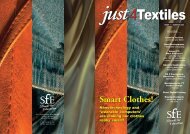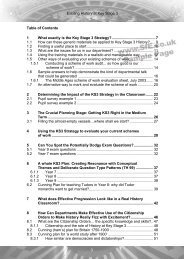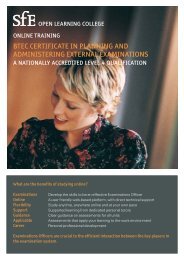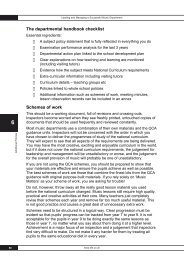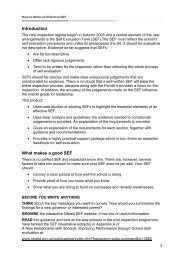Experiential RE supdocs.indd - SfE
Experiential RE supdocs.indd - SfE
Experiential RE supdocs.indd - SfE
Create successful ePaper yourself
Turn your PDF publications into a flip-book with our unique Google optimized e-Paper software.
write down or throw away regrets or special thoughts, light candles or simply eat symbolic food to<br />
help them remember an aspect of a festival or ritual. In planning lessons it is helpful to think about<br />
what we can ask pupils to do or take part in that will aid their learning, as well as bringing in the<br />
kinaesthetic dimension, so important in engaging pupils with different learning styles.<br />
Theatre of Learning works because it uses all the learning styles but is also a process that<br />
engages the feelings and the imagination as well as the mind. Theatre of Learning is a<br />
holistic process developing the spirituality of teachers and pupils.<br />
Without realising it I was unconsciously transferring to <strong>RE</strong>, a formal written subject, many of the<br />
communication skills I had learned as a counsellor and introduced into PSHE, when I began<br />
teaching it twenty years ago. Step by step I tried things out, gradually refining what I did into a<br />
number of techniques that could be applied to any age range, for any programme of study. It was<br />
unconscious because, at that time, I no longer taught PSHE and was not aware of the influence<br />
its active approach was having on the changes I was making to the way I taught <strong>RE</strong>.<br />
Applying Theatre of Learning techniques to PSHE and Citizenship<br />
Ten years on, the process of Theatre of Learning in <strong>RE</strong> is being shown to teachers all over the<br />
UK, Australia and New Zealand. During the period of its development I became an Advanced<br />
Skills Teacher working on in reach in my school. In this role, where I mentored and coached<br />
teachers in a number of departments, I had the opportunity to see how the Theatre of Learning<br />
could be applied in other areas of the curriculum. Striking results occurred in geography, for<br />
example, where two NQTs transformed behaviour and motivation in their classes by applying the<br />
techniques to some of their lessons.<br />
A turning point occurred in January 2005; the day before I returned to school for the spring term.<br />
I wrote the last sentence for a series of teacher resource files on <strong>RE</strong> which had taken five years<br />
to complete. It was a significant moment, one that I will always remember. It was filled both with<br />
immense satisfaction and also a sense of loss. What now?<br />
Then I realised what a pivotal moment it was.<br />
The next day, in one of the many unplanned twists of fate that occur for all of us, I was returning<br />
to school with an additional role. Deep in the trauma of special measures and with HMI (Her<br />
Majesty’s Inspectors) concerned about the personal and spiritual development of our pupils, we<br />
had found ourselves without a head of PSHE and Citizenship. I had come full circle.<br />
Focusing on PSHE and Citizenship again, with all the techniques I had developed in <strong>RE</strong>,<br />
presented me with the possibility of extending them to these areas. The concept of multi-sensory<br />
learning with its potential to engage, motivate and promote memory and understanding, was<br />
something I was keen to do, but most of all I wanted to use them to change pupils’ attitudes, to<br />
enable them to care, and to care enough to change their own behaviour and do something about<br />
injustice.<br />
I mounted a two stage campaign: Step One is about ‘Making the Connection’, raising awareness<br />
of citizenship across and within the life of the school. How I did this is not relevant here, but<br />
during the second stage, Step Two, which was about using Theatre of Learning techniques<br />
across the curriculum to develop an awareness of Citizenship, I discovered and developed<br />
techniques for promoting positive moral values, attitudes and beliefs in young people that made a<br />
difference to my <strong>RE</strong> teaching. These are:<br />
Confidential feelings visualisations in which pupils can explore alternative feelings in tempting<br />
situations.<br />
<strong>Experiential</strong> <strong>RE</strong>: Supporting documents<br />
11



